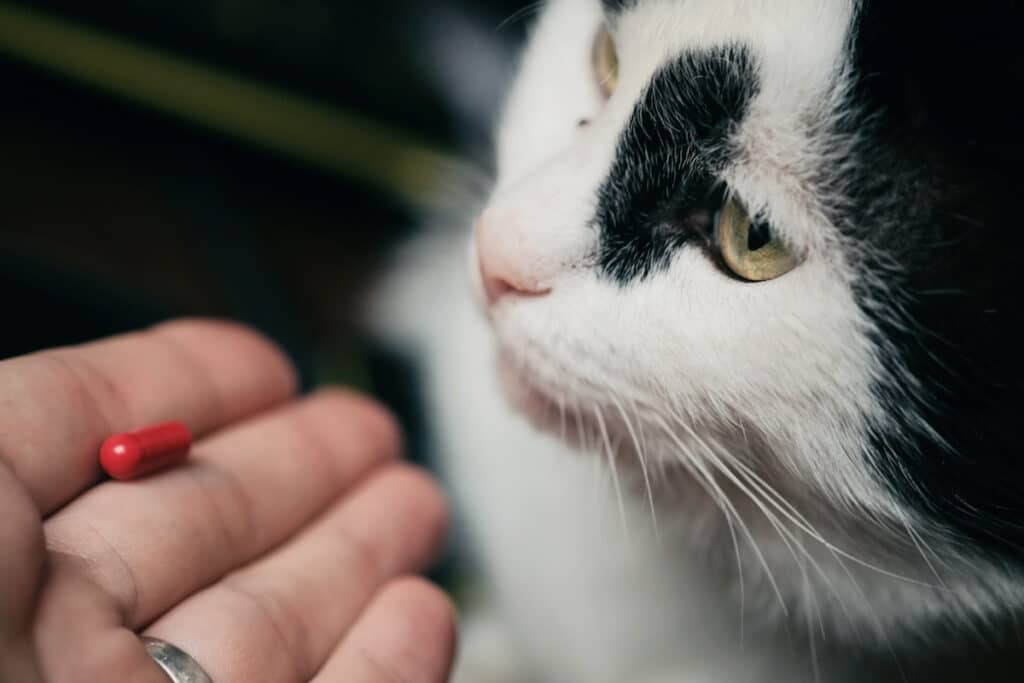Vitamin E is one of many important nutrients that cats need. Vitamin E is an antioxidant that plays a crucial role in the immune system, circulatory system, liver health and skin health. Most cats will get enough vitamin E through commercial wet and dry cat foods. However, deficiency of vitamin E in your can can be serious. Symptoms include muscle weakness, fatigue, loss of appetite, pain and fever.
Why Cats Need Vitamin E
Vitamin E is an essential nutrient for your cat. It’s considered an antioxident, which means it breaks down free radicals in the body. Free radicals are a normal by-product of oxidation and metabolism in cats, but too many can be toxic. Having an excessive free radical buildup will damage cell membranes and DNA.
Vitamin E primarily works by stabilizing free radicals thereby maintaining immune and circulatory health. Not only that, but vitamin E also helps keep cats’ skin healthy and vision sharp.
Chances are your cat is getting enough vitamin E from their wet or dry cat food. Manufacturers specifically add in vitamins and minerals like vitamin E to give your cat a well-rounded diet.
And unlike humans, cats can safely consume a lot of vitamin E without having toxic side-effects.
Where is Vitamin E Found?
Vitamin E is found naturally in a lot of foods. Most wet cat foods and dry cat foods will have vitamin E added to them. However, if you’re thinking about making your own cat food at home, it’s a good idea to know which foods vitamin E is in. Truthfully, not many foods that are safe for cats contain vitamin E. That’s why you’ll most likely have to supplement this vitamin if you make your own cat food at home. Some foods naturally containing vitamin E are:
- Fish such as cod, salmon and trout
- Nuts and seeds like cashews, sunflower seeds and almonds
- Fruits like avocados, blackberries and kiwi
- Vegetables like broccoli, asparagus and collards
Vitamin E Supplements
Just about all wet and dry cat foods on the market already have vitamin E added. This is why it’s so important to only feed your cat a diet of cat-specific food. There’s no guarantee that dog food or human food will give them the nutrients they need.
As mentioned previously, you’ll probably have to use supplements to give your cat enough vitamin E if you make your own cat food at home. Supplements with vitamin E come in powder, pill, soft chew and liquid forms.
Cat multivitamins have a wider range of nutrients in them, and pretty much always include vitamin E. Because of this, you won’t need to provide extra vitamin E supplements to your cat if they are already taking a multivitamin.
How Much Vitamin E Does My Cat Need Every Day?
The amount of vitamin E your cat needs each day is dependent on the brand and type of supplement you give them. For instance, the amount measure in liquid vs powdered format will be different.
Always read the supplement container for the dosage you’re supposed to give your cat. As a general rule cats need about 30 IU of vitamin E per day.
Some people prefer to give their cat vitamin E supplements meant for humans. It’s perfectly fine to do this, just be sure there are no added ingredients that could be harmful to your cat. You’ll also need to calculate the dosage for your cat as the dose on the bottle will be for people and therefore incorrect. If you do this, we recommend getting vitamin E in liquid form and measuring out 30 IU for your cat each day.
Signs of Vitamin E Deficiency in Your Cat
Even though it’s unlikely that your cat will develop a vitamin E deficiency, it’s still useful to know the symptoms. If you suspect your cat has a vitamin E deficiency or is showing other concerning signs of illness, see a vet right away.
- Muscle weakness
- Irregular heartbeat
- Problems when going to the litter box
- Fatigue and lethargy
- Lumpy fat deposits under the skin
- Loss of appetite
- Pain
- Fever














